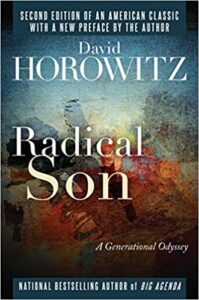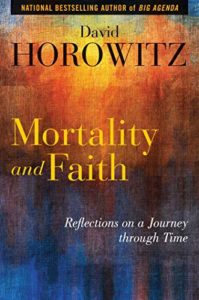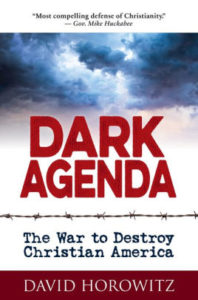 |
 |
 |
 |
 |
 |
 |
 |
 |
NEW!
 “Horowitz blows the lid off Black Lives
“Horowitz blows the lid off Black Lives
Matter lies and exposes the damage the
movement has done to the black community.”
—LARRY ELDER, bestselling author and host of
The Larry Elder Show
“In his new book, I Can’t Breathe: How a Racial Hoax Is Killing America, Horowitz exposes the sickness at the heart of our national nightmare. This book is essential, don’t miss it.”
—MARK LEVIN, nationally syndicated TV and radio host and
author of Unfreedom of the Press
Order Now
The Truth about the Black Lives Matter Martyrs
In his latest salvo in the battle for America’s survival, David Horowitz exposes the racial hoax that is spawning riots and dividing the nation. Examining the twenty-six most notorious cases of police “racism”—from Trayvon Martin and Michael Brown to George Floyd and Breonna Taylor—Horowitz demonstrates that Black Lives Matter has lied about every one of them in its quest to break down law and order, fuel race hatred, and destroy America.
In case after case, the lies and mythmaking break down under Horowitz’s scrutiny. Even the chief prosecutor in the George Floyd case was forced to admit that he had no evidence of racial bias, while Breonna Taylor, the longtime accomplice of a major drug dealer, was killed when she and her boyfriend resisted arrest and fired a weapon at the police.
The unchallenged myths about racist murders by the police have brought mayhem and crime to our cities, where the victims are predominantly black. They are also a slander against the United States, the least racist country in history, and against black Americans, the vast majority of whom are successful and law-abiding citizens.
Now the Biden administration has embraced the false narrative of “systemic racism” and “white supremacy,” which supposedly infect every aspect of American life, using it to justify a witch hunt for “domestic terrorists.” Most Americans, black and white, know in their bones that this portrayal of their country is a lie. An unflinching and courageous accounting, I Can’t Breathe is the urgently needed proof that they are right.
“The Enemy Within is a book for all patriots who understand that our country is in a fight for its life.”—MARK LEVIN
Order Now
America on the Brink
A questionable election. The president of the United States illegally impeached—twice—and silenced. The First Amendment hanging by a thread. The national heritage under attack. Mob violence. America is on the brink of becoming a one-party dictatorship.
How did this happen?
The Enemy Within: How a Totalitarian Movement Is Destroying America provides the answer. David Horowitz has been the bête noire of the Left for decades on account of his courageous revelations of their aims and tactics, and now he sounds the alarm: the barbarians are already inside the gates.
Horowitz lays out how we have ended up in the worst national crisis since the Civil War. He details:
• The Left’s embrace of Critical Race Theory and Cultural Marxism—the underpinnings of their totalitarian ideology
• The decades-long infiltration of our education system by ideologies hostile to America, our institutions, and our freedom
• Why the Obama administration marked a point of no return in the division of America into two irreconcilable political factions
• The Democrats’ unprincipled campaign to destroy a duly elected U.S. president
• Their political exploitation of the coronavirus pandemic
• Their complicity in the riots of the summer of 2020, which left twenty-five dead, injured two thousand police officers, caused billions of dollars in property damage, and revealed the fragility of our civic order
As Abraham Lincoln so presciently warned on the eve of America’s last existential crisis, “If destruction be our lot, we must ourselves be its author and finisher. As a nation of freemen, we must live for all time, or die by suicide.” In The Enemy Within, David Horowitz provides a spot-on assessment of the threat to the American Republic and points to an escape route—while there’s still time.
One of the most compelling and important political memoirs in recent American history— republished after more than twenty years with a new introduction by the author.
From the Author of Blitz, a New York Times Bestseller
Order Now
Radical Son is one of the best political memoirs I’ve read. Though it is really a love story—one man becomes passionately enamored with freedom, responsibility, and reason. Or maybe it’s a book about faith healing, a true account of how belief in human dignity and individual rights cures blindness, folly, and hatred. Anyway, everyone who was ever involved with or influenced by the New Left should read David Horowitz’s words, and then eat their own. I think the last political book that affected me this strongly was Hayek’s Road to Serfdom.” — P.J. O’Rourke, Author of “Age and Guile Beat Youth, Innocence, and a Bad Haircut”
“David Horowitz’s political pilgrimage from a Sixties radical to a Reagan conservative—and the friends and enemies he has made along the way—makes for a very interesting, very compelling story. Speaking as a conservative: it’s much better to have David Horowitz with you than against you. Radical Son demonstrates why.” — William J. Bennett, Author of “The Moral Compass”
“Watch out all of you statist shills and racialist hucksters out there who think you have gotten away with murder and mayhem over the last five decades, with alibis and applause from the media and the academy: David Horowitz has got your number and your jugular. In the first great American autobiography of his generation, this ardent writer on the ramparts remorselessly tracks them all down, going deep into the lairs of the professional liars of the left—the guilty and the gulled, the sadistic and the philanderous, the vain and the vicious—and strips away their tawdry veneer of glamour and idealism to reveal the vile truth—about the Black Panthers and the rest of the revolutionary felons and felines, and finally, in gut-wrenching candor, himself.” — George Gilder
“David Horowitz’s intimate, touching and uplifting book tells us not only about the depth and integrity of the author, but it also provides a window into the great divide in our world today. He shows us the difference between those who recognize that despite man’s limitations we should never lose sight of the fact that we are all created in the image of God and treat each other accordingly, and those who seek to change the world no matter what the cost even to life itself.”
-Natan Sharansky
Mortality and Faith is the second half of an autobiography of David Horowitz whose first installment, Radical Son, was published more than twenty years ago. It completes the account of his life from where the first book left off to his seventy-eighth year.
In contrast to Radical Son whose focus was his political odyssey, Mortality and Faith was conceived as a meditation on age, and on our common progress towards an end which is both final and opaque. These primal facts affect all we see and do, and force us to answer the questions as to why we are here and where we are going with conjectures that can only be taken on faith. Consequently, an equally important theme of this work is its exploration of the beliefs we embrace to answer these questions, and how the answers impact our lives.
Order Now
The Big Subjects, Brilliantly Pondered: David Horowitz isn’t just a repository of political wisdom
A Review of Mortality and Faith By Bruce Bawer
Although I was delighted when David Horowitz’s savvy treatise on Donald Trump, Big Agenda, became a top bestseller during the first days of the Trump presidency, I vividly recall wishing at the time that as many readers were acquainted with the other, equally invaluable side of Horowitz – the side that has produced, among other things, a trio of short, remarkable autobiographical works, The End of Time (2005), A Point in Time (2011), and You’re Going to Be Dead One Day (2015). Reviewing the last of these books – using words that apply equally well to the other two – I described it as “a poignant, bittersweet, captivating” volume that “mesmerizes from beginning to end, capturing with rare artistry the day-to-day musings of a man who is at once an intellectual and a poet” and who is at once capable of conveying “profound thoughts in restrained, unadorned, and unpretentious language” and of communicating “intense emotions while utterly eluding sentimentality or mawkishness.”
Continue reading
“One of the most intellectually compelling and rational defenses of Christianity’s role in America. A delightfully readable explanation of how Christian principles were the bedrock of the American Revolution, and how the anti-American left has targeted Christians because of that.”
—Mike Huckabee
“Read this disturbing but vital book.”
-Tucker Carlson
Order Now
Read the first chapter HERE
Read reviews HERE
In Dark Agenda, New York Times bestselling author David Horowitz exposes not only the progressive war against Christianity, but also a war against America and its founding principles, which are Christian in their origin. Dark Agenda is about an embattled religion, but most of all, it is about our imperiled nation. Tackling a broad range of issues from prayer in the schools to the globalist mindset, Horowitz traces the anti-Christian movement to its roots in communism. When the communist empire fell, progressives did not want to give up their utopian anti-God illusions, so instead they merely changed the name of their dream. Instead of “communism,” progressives have re-branded their movement as “social justice.” Dark Agenda shows how the progressives are prepared to use any means necessary to stifle their opponents who support the concepts of religious liberty that America was founded on, and how the battle to destroy Christianity is really the battle to destroy America.
The Black Book of the American Left is first of all a narrative map of the battles fought over the last 40 years and — it must be said – lost, almost every one. The Black Book contains a record as complete as any likely to be written of the struggle to resist a Communist-inspired Left that was not defeated in the Cold War but took advantage of the Soviet defeat to enter the American mainstream and conquer it, until today its members occupy the White House.
“This is the poisoned well of the radical heart: the displacement of real emotions into political fantasies; the rejection of present communities for a future illusion; the denial of flesh and blood human beings for an Idea of humanity that is more important than humanity itself.”
—David Horowitz, The Politics of Bad Faith
“David Horowitz is an enormously important thinker among American conservatives.”
—The Weekly Standard
“If there were any justice, these volumes – which began coming out in 2013 – would be widely recognized as definitive studies of the politics of modern American life.”
Each volume of the Black Book is available at the Frontpage Magazine bookstore and also is available as a Kindle ebook from Amazon.com.
Introduction to Volume IX
Ruling Ideas
By David Horowitz
When I began the project of describing this movement in the 1980s, the emergence of the left as a mainstream force in America’s political life was fairly recent and inadequately understood. Conservatives in particular often failed to appreciate the anti-American animus of the left and its apocalyptic goals. At the same time, conservatives imprudently accepted the left’s deceptive claims to be “liberal” and “progressive,” ascribing to it idealistic intentions that masked its malignant designs. The contents of these volumes were conceived as a corrective to these false and disarming impressions. This is the ninth and final volume of my writings about progressivism, a movement whose goals are the destruction of America’s social contract at home and the defeat of American power abroad.
The primary source of this confusion is the fact that left-wing politics are based on expectations of an imaginary future rather than assessments of a usable past. The left’s primary focus is not on practical improvements based on an analysis of previous practices, or a conception of the limits imposed by human nature, but on changes designed to satisfy the moral prejudices that make up the leftist faith.
Nowhere is this clearer than in the left’s quest for “equality,” which is the organizing principle of its “transformative” proposals. Equality before the law is a foundational principle of American democracy and its pluralistic community. But this is not the equality proposed by the left, which demands instead an unrealizable and destructive equality of outcomes. In the real world human inequalities of talent, intelligence, physical attributes and application are immutable facts of life, which result in inequalities of wealth and power. The seeds of social inequality are planted in the human genome and are nourished by disparate cultures, which include circumstances of birth and upbringing that governments cannot control. Attempts to establish such control have invariably resulted in the most repressive regimes in human history, and in the end have failed to produce either equality or wealth.
The ideal of an egalitarian future is doomed to failure because it is unanchored in any human reality. It is sustained as an ideal because it allows advocates to regard themselves as revolutionary pioneers of a “better world.” It further prompts believers to devalue the present and dismiss the past, which allows them to distance themselves from the destructive results of their social experiments. Thus progressives habitually dismiss the disasters they have engineered, however epic in scope, by attributing the monstrous results to inadvertent “mistakes,” when they were in fact the logical consequences of their Utopian ideas.
When the Soviet socialist system collapsed, progressives created an artificial distinction between the ideal, which they called “real socialism,” and the disaster, which they called “actually existing socialism.” This allowed them to avoid any recognition of their role in the human catastrophe they had supported and served for generations. Consequently, the experience had no lessons for progressives because in their self-absolving view it wasn’t “real socialism.” This delusion has now been passed to the next generations as a result of the left’s infiltration of America’s educational system and its transformation into a training and recruitment center for collectivist causes and ideas.[1]
The current term leftists use to describe their Utopian vision of the future is “social justice” rather than communism or socialism.
The new name is part of a familiar process by which the left attempts to shed the disasters of its past. One would be hard-put to distinguish the goals encapsulated by “social justice” from the communist attitudes of previous generations. Like communism, “social justice” is a promise of harmony and redemption. Like communism it describes a future in which inequality, poverty, bigotry and the timeless corruptions of the human spirit are miraculously rectified by political parties and the state. Like communism, “social justice” requires for its realization a remake of humanity. Like communism, therefore, it can only be achieved through the destruction of individual freedom, and the thwarting of normal human desires and interests in order to achieve an allegedly greater social good.
The bloody history of progressive experiments during the 20th century should have buried the illusion that human beings can be transformed into creatures radically different from what they have been for the five thousand years in which their actions have been recorded. Human societies are reflections of the human beings who create them, not the other way around. Inequality, bigotry, hypocrisy and greed are elements of a genome that thousands of years of evolution have failed to alter or repair. As a result, progressive states dedicated to “social justice” have flooded the earth with the corpses of innocents who stood in their way, and created poverty and misery on an unprecedented scale. Yet the religious fantasy of a liberated future persists to this day among an alarming array of constituencies, and the left’s assault on individual freedom proceeds as though these historical tragedies had never taken place.
The tenacity of the progressive illusion and its imperviousness to experience are natural effects of its religious nature. The solace provided to believers through hope in a redeemed future is as existentially crucial as a belief in God or in life after death. It makes relinquishing the illusion as devastating as a loss of religious faith. How else explain the persistence of a fantasy that has proven so destructive?
Since the industrial revolution, the progressive illusion has been encouraged by advances in technology that might seem to augur human possibility without limit. Yet to date these advances, however impressive, have not led to dramatic improvements in human behavior—specifically its moral dimensions—let alone the degree of improvement that Utopian visions require. Meanwhile, the same advances have produced new technologies of totalitarian control along with vastly amplified means of destruction that serve to magnify human barbarism and put into question the very survival of civilization.
Half a century ago Friedrich Hayek described “social justice” as a mirage. Hayek observed that there is no entity called “society” to redistribute wealth, or to re-calibrate the social order. There are only individuals belonging to political factions that vie for power and then wield it through their power in the state.[2] “Social justice,” therefore, is necessarily the work of individuals driven by the same greed, prejudice, and habits of deceit that created the injustices progressives propose to repair. In its real-world practice “social justice” is, and can only be, the self-justifying rationale of a new despotism—worse than the old because its first agenda is a war against freedom, in particular the freedom of individuals to resist the social redeemers and their plans.
This was the conclusion I reached forty years ago under the influence of Hayek and the Polish philosopher Leszek Kolakowski, and why I resolved to devote the second half of my life—and eventually the nine volumes of this work—to analyzing and opposing this destructive cause.
Part One of this concluding volume features three essays on themes which have more or less defined my life’s work. “The Fate of the Marxist Idea” originated as a chapter in The Politics of Bad Faith (1998). It is composed of two letters to former comrades announcing my break with the left, and explaining the reasons why anyone concerned about humanity or justice should do the same. The first letter was written to Carol Pasternak Kaplan, a childhood friend whose father Morris was a cell leader in the local Communist Party. The second was written to Ralph Miliband, my political mentor and friend, as well as father of David Miliband, a future British Secretary of State for Foreign and Commonwealth Affairs, and of Ed Miliband, a future leader of the British Labour Party.
In the quarter-century since I published these reflections, there have been no attempts by progressives to answer them. This would be explicable if leftists considered my views unworthy of their attention. But that is not the case. I have been the subject of unflattering feature profiles in leftwing magazines such as The Nation and Tablet, and in papers of record (also on the left) such as The New York Times, the Chronicle of Higher Education and The Washington Post. The Internet is a repository of tens of thousands of leftist posts, including entire websites, filled with anti-Horowitz abuse. What is lacking is an intellectual argument to refute my views and specifically my reasons for rejecting the left; or reference to a historical record that would provide a critical response to the case I have made.[3]
“Slavery and the American Idea” is about the destructive ends to which progressive aspirations lead, in particular the determination to destroy the American social contract and the constitutional system that supports it. Race has been a primary weapon in this attack, which is why Volume 6 in this series is devoted to the subject. This essay attempts to retrieve the historical record and celebrate the America Idea, which is responsible for ending slavery and encapsulates the vision that is opposed to all the destructive themes documented in these volumes. “Slavery and the American Idea” first appeared as the concluding chapter of Uncivil Wars, an account of the 2001 controversy I provoked by opposing the demand for reparations more than a century after slavery was abolished. It has been edited for inclusion in this volume.[4]
These two ideas—the American and the Marxist—may be said to constitute an ideological thesis and antithesis of the modern world. The resolution of the conflict between them will shape the course of human freedom for generations to come.
“America’s Second Civil War” locates the source of the deep division of America’s political life in the adoption of “identity politics” as the left’s “progressive” creed. In this extension of Marx’s faulty model of domination and oppression, the left is now committed to a political crusade that is racist and collectivist, and thus the antithesis of the principles that are the cornerstones of America’s social contract.
“The Two Christophers” is an effort to define the parameters of the left through an essay on the life and thought of radical contrarian Christopher Hitchens, whom I first met in England in the 1960s and befriended in the last years of his life. Some have regarded Christopher’s intellectual path as similar to mine because of his support for America’s war in Iraq, and his belated recognition of the virtues of a country with which he was once at war. This is an unwarranted reading of Christopher’s odyssey. In reflecting on Christopher’s political course, I have attempted to show how utopianism and the romantic idea of a revolutionary transformation continued to shape his political choices and kept him from having consistent (or even coherent) second thoughts. His political trajectory clearly marks the differences between us, and allows me to measure the distance I traveled in leaving the left. It thus provides a way to understand what it means to be the kind of progressive examined in these volumes, so it may function as a useful guide to the great schism of our times.
Part Two of Ruling Ideas provides several aids for readers of my work. The first is an account of my life and work by my friend and colleague, Dr. Jamie Glazov, appropriately the son of a courageous Soviet dissident. Dr. Glazov’s article is an updated version of an essay that first appeared as the introduction to Left Illusions, an earlier collection of my writings published in 2003. Dr. Glazov’s account is both accurate and insightful, and will be a helpful guide to those interested in my work.
The second is a bibliography of my writings compiled by Mike Bauer, who has also provided invaluable help in editing all the texts in this series.
Finally, David Landau, who has copy-edited and indexed the entire series, has also prepared a summary index to all nine volumes.
[1]See Volume 8 in this series, The Left In The University. Cf. also https://www.nas.org/projects/making_citizens_report/the_report
[2]Friedrich von Hayek, Law Legislation and Liberty: The Mirage of Social Justice, Univ. of Chicago Press, 1976
[3]In fact I have on occasion invited academic leftists into the pages of Frontpagemag.comto construct such arguments. But the exercise has merely demonstrated their inability to do so. This was the case with leftist historian Kevin Mattson, the author of Rebels All!, a book which describes me as a seminal figure of the modern right, an exemplar of “the post-modern conservative intellectual.” Unfortunately, Mattson was incapable of getting the most basic elements of my conservative views straight, and was uninterested in correcting his mistakes when they were pointed out to him. See “Getting This Conservative Wrong,” in Volume 1 of this series, pp. 121 et seq.
[4]Volume 6 of this series, Progressive Racism, contains an account of my conflict with the left over reparations and the American idea.
Table of Contents
Introduction to Ruling Ideas i
Part I 9
- The Fate of the Marxist Idea 11
- Slavery and the American Idea 87
- America’s Second Civil War 129
- The Two Christophers
(or, The Importance of Second Thoughts) 139
Part Two 187
- The Life and Work of David Horowitz
(an essay by Jamie Glazov) 189
- End Note by David Horowitz 229
- The Writings of David Horowitz
(a bibliography by Mike Bauer) 231 - Index for Volume IX, Ruling Ideas 287
- Summary Index for The Black Book of the
American Left (by David Landau) 303
From the Author
I welcome comments on the Black Book and will reply to as many as I am able. I especially welcome comments from the left which so far has pretended that this critique does not exist. This is a throwback to the Stalinist era, and I hope that there are some leftists with the integrity to attempt to meet an argument rather than stamping it out. I hope all commenters will treat the intellectual issues involved and not resort to name-calling and anti-intellectual rants.
David Horowitz




